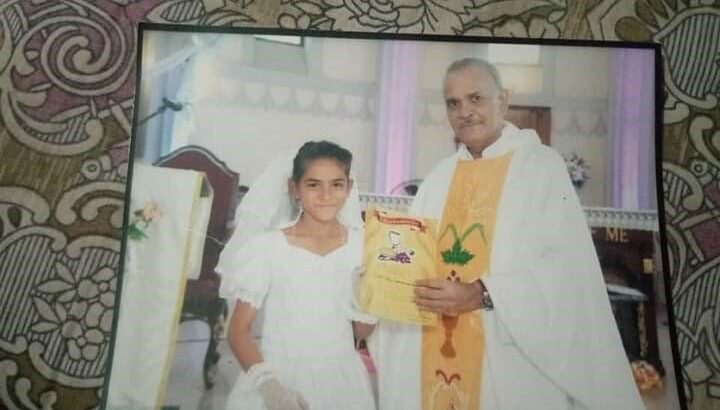One of the most distressing aspects of the persecution of Christians in Pakistan is the frequent kidnapping of teenage Christian girls. After being kidnapped, these girls are coerced into converting to Islam and then placed in forced marriages with one of their kidnappers. There have also been cases of these girls also being forced into prostitution before and after their “marriages”. This issue is only getting worse. Pakistan’s Movement for Solidarity and Peace reported that in 2019 around 1,000 Hindu and Christian women and girls in Pakistan were kidnapped and coerced into forced marriages. It is believed by some that in 2020 this number doubled to around 2,000 cases of kidnappings and forced marriages.
Previous Legal Battles

By forcing the girls to convert to Islam the kidnappers make the return of the girls to their families far less likely. It is unlikely for many courts in Pakistan to allow a girl who has legally converted to Islam to return to her family out of fear she will revert to the religion she actually believes in, whether it be Christianity or Hinduism. The families of these girls face an uphill legal battle in court, as the legal process will put as many hurdles as possible in their way. Non-Muslim families must be represented by a Muslim lawyer in the courts and the cases are held under the principles of Islamic law, which Pakistan’s Christians and Hindus are unfamiliar with. Frequently the kidnapper will have more lawyers working on his case, giving him an obvious advantage.
The 2014 Sindh Child Marriage Restraint Act and other similar legislation was supposed to try to tackle the issue of abductions and forced marriages in Pakistan. The Child Marriage Act raises the legal age of marriage to 18-years-old, an attempt to make marriage of abducted teenage girls illegal. This act has been ignored by many Pakistani courts who rule using Islamic legal principles if the girl has been forced to convert to Islam. Marriages have been ruled as legal by Pakistani courts if the girl has “converted” to Islam and has also entered puberty. This scandalously happened in the case of 14-year-old Catholic girl Huma Younus, who was abducted in October 2019. She was forced to convert to Islam and then married to one of her abductors. In February 2020, a court ruled she was legitimately married as she had legally converted to Islam and had entered puberty.
The failure to implement the Child Marriage Act is an example of a trend over recent years in Pakistan. There are Pakistani politicians who are, to their credit, sincerely trying to improve the situation for Christians and other religious minorities in the country, but they are often thwarted by other politicians and by judges.
An Appeal for Refuge

Even if the girl manages to return to her family, the girl and her family are at risk of retribution, as the girl will be regarded by many fundamentalists as an apostate from Islam. This was the case with Maira Shahbaz, a 14-year-old Catholic schoolgirl from Faisalabad in Punjab. Maira was abducted at gunpoint in April 2020. After being kidnapped Maira was raped, forced to sign a statement that she converted to Islam and then was “married” to one of her kidnappers.
Maira’s family brought the case to court to try to get their daughter back. The case came before the High Court in Lahore, who outrageously ruled that the 14-year-old Maira was legitimately married and had converted to Islam. This was despite evidence that Maira was clearly underage. Maira broke into tears in the court as the judge made his inexcusable ruling. In August 2020, Maira managed to escape back to her family. Maira rubbished the idea that she had converted and was willingly married. Maira and her family now live in fear of retribution. Maira is now regarded as an apostate by many Islamists, putting the Catholic girl and her family at risk of retribution.
In February 2021, Aid to the Church in Need (ACN) in Britain handed in a petition to the British Government to grant Maira asylum in the UK. The British Prime Minister, Boris Johnson, has signalled his support for persecuted Christians before and has set up a Special Envoy for Freedom of Religion or Belief. This case is a test as to whether this stated support is empty rhetoric or if it will be backed by meaningful action to help real persecuted Christians. ACN’s petition was publicly supported by the Anglican Bishop of Truro, the Coptic Orthodox Archbishop of London and the Founding President of Christian Solidarity Worldwide.
A New Project
Giving the seriousness of these issues, the Pakistani Catholic Bishops’ Catholic Commission for Justice and Peace (CCJP) will start a new campaign for greater protections and safeguarding measures for girls from religious minorities, including Christian girls. CCJP is receiving support and aid from ACN for this project. The director of CCJP, Fr. Emmanuel Yousaf, spoke about kidnappings and forced marriages in Pakistan:

“One of the most noted challenges has been the recent rise in cases of abduction, forced marriage and forcible conversion. This phenomenon, though not new, has catalysed during the recent past, due to the lack of adequate laws and the absence of implementation of existing safeguards to protect the young minor girls and women from the religious minority community.”
The CCJP plans on consulting and contacting politicians and other representatives to raise awareness of the issue of abductions and forced marriages and will advocate for solutions. Fr. Yousaf details some of the work already done:
“We at CCJP have been documenting and monitoring the incidents of abductions, forced marriage and conversion which have been found to be occurring with Hindu and Christian minor girls and also adult women. The surrounding pressure in courts from extremist groups, the biased attitude of police, the fear of harm from the abductor, and stigma associated force the victim to often give a statement in favour of her abductor. CCJP believes that in order to initiate and effect change, there is a need to engage both nationally and internationally to raise a voice, demand that the state takes adequate action on the said issue and also mobilise a public appeal for legislation.”
Please pray for the work of ACN and the CCJP in Pakistan, that we may secure rights and protections for Christian girls in Pakistan. If you would like to stay up to date with ACN’s projects, please consider subscribing to our email newsletter at https://www.acnireland.org.
This feature was sponsored by Aid to the Church in Need Ireland


 Arzoo Raja with the priest at her first communion. The 13-year-old Catholic girl was kidnapped in October 2020 and placed in a forced marriage. Photo: Aid to the Church in Need
Arzoo Raja with the priest at her first communion. The 13-year-old Catholic girl was kidnapped in October 2020 and placed in a forced marriage. Photo: Aid to the Church in Need